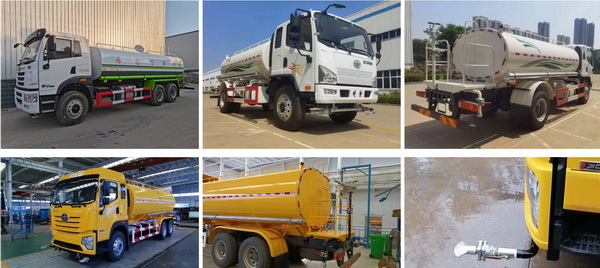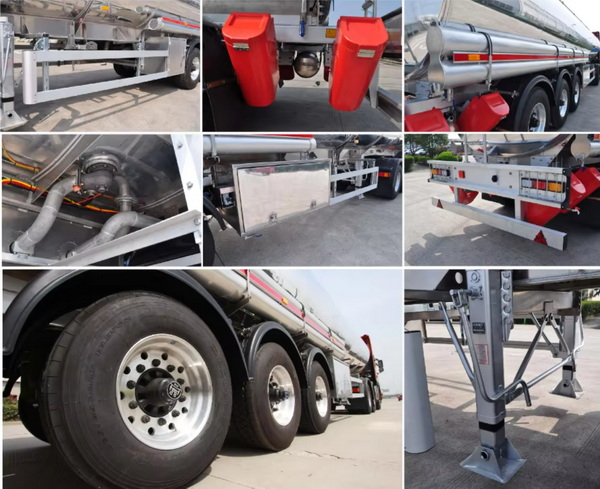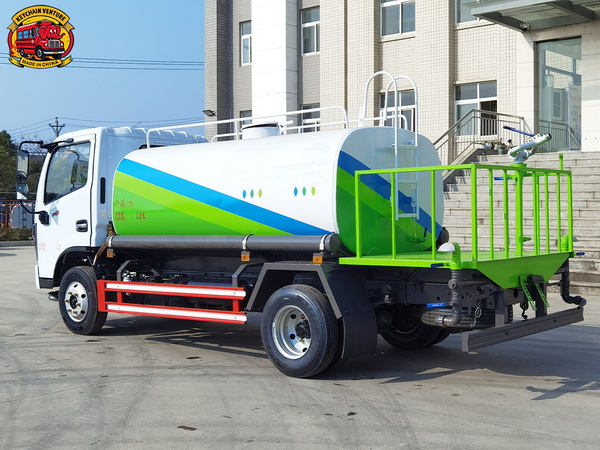Views: 222 Author: Amanda Publish Time: 2025-08-25 Origin: Site








Content Menu
● What Does a Water Truck Driver Do?
● Water Truck Driver Salary Overview
● Factors Influencing Water Truck Driver Salaries
● Typical Work Environment and Responsibilities
● Safety Tips for Water Truck Drivers
● Essential Maintenance for Water Trucks
● Career Progression and Opportunities
● FAQ
>> 1. What qualifications do I need to become a water truck driver?
>> 2. How much can I expect to earn as a water truck driver?
>> 3. What industries hire water truck drivers?
>> 4. What are the main safety considerations for water truck drivers?
>> 5. How do water truck drivers maintain their trucks?
Water trucks play a crucial role in various industries such as construction, mining, agriculture, and oilfields by transporting and distributing water to remote and work sites. They are essential for dust control, soil compaction, firefighting, and other important tasks. Given their importance, water truck drivers are often sought-after professionals, and many people are curious about their salary prospects, job responsibilities, and career progression.
In this comprehensive article, we will cover everything you need to know about water truck drivers, focusing on their salaries, job duties, safety, maintenance, and career outlook. We'll also provide detailed information on the nature of the work, factors that influence earnings, and tips for success in this specialized driving profession.

Water truck drivers operate specialized vehicles equipped with large tanks designed to carry and distribute water. Their primary responsibility is to transport water to designated locations such as construction sites, mining operations, dust control areas, and agricultural fields.
Key duties typically include:
- Driving water trucks safely on and off public roads, often navigating difficult terrain such as unpaved roads, hills, and mountains.
- Filling and emptying water tanks using specialized equipment such as vacuum pumps, hoses, and spray bars.
- Performing daily pre-trip inspections to ensure the vehicle and equipment are in safe operating condition.
- Routine maintenance tasks, including greasing, checking brakes, and cleaning the water tanks.
- Maintaining accurate logs and reports, including compliance with Department of Transportation (DOT) regulations.
- Operating valves and other hand tools needed for water distribution at job sites.
- Coordinating with site supervisors and other personnel to ensure efficient water supply.
- Managing water loads carefully to avoid spillage and maintain vehicle stability.
- Adhering strictly to environmental and safety regulations to prevent accidents and contamination.
In some industries, such as oil and gas exploration, water truck drivers may also handle hazardous materials or fluid disposal jobs, requiring additional specialized knowledge and certifications. This role requires physical stamina, technical skills, and a high level of responsibility to ensure water is delivered safely and efficiently.[1]
Water truck drivers in the United States earn an average salary of approximately $50,440 per year as of 2025. Their hourly wages average around $24.25, but this can vary significantly based on factors such as experience, geographic location, employer type, and shift patterns.
Salaries typically range from about $35,000 per year for entry-level drivers to upwards of $70,000 or more for drivers with specialized skills or experience. Some drivers earning overtime or working in high-demand areas can earn even higher wages.
Higher salaries are common in states with active construction, mining, and oilfield operations that require frequent water trucking services. For example, California and North Dakota are among the top-paying states. Cities such as San Diego, Laramie, and Magna offer competitive wages due to the volume of work and demand for qualified drivers.[2]
Several factors contribute to how much water truck drivers can expect to earn:
- Geographic Location: Certain states and regions, particularly those with booming industrial and resource extraction sectors, offer higher pay. Remote and rural areas with limited labor supply also pay premium wages.
- Experience Level: As with many skilled trades, experienced drivers command higher wages. Knowledge of complex operations such as frac water hauling or mining water delivery can significantly boost earnings.
- Industry Sector: Water truck drivers working in the oil and gas industry, mining, or large-scale construction projects often receive better remuneration compared to those employed by smaller companies or in less specialized roles.
- Certifications and Skills: Possession of a Commercial Driver's License (CDL) with a tanker endorsement, as well as safety certifications and additional training, improves job prospects and salary potential.
- Work Hours: Overtime, night shifts, and extended work hours common in mining or oilfield operations contribute to higher overall pay. Drivers who accept inconvenient or challenging schedules may benefit financially.
- Company Size and Benefits: Larger firms often provide better pay packages, health benefits, and retirement plans compared to smaller employers.[3][2]
Water truck drivers often work in physically demanding and challenging environments. They may be required to navigate difficult terrains such as mountains, dirt roads, and construction zones, which requires advanced driving skills and alertness.
Work environments include:
- Large construction sites and highway projects.
- Mining operations in remote areas with rugged conditions.
- Oilfield locations requiring fluid hauling and disposal.
- Agricultural fields needing irrigation support or dust suppression.
- Municipal or environmental projects such as firefighting and road beautification.
Typical responsibilities include:
- Operating water trucks equipped with tanks ranging from 2,000 to over 4,000 gallons.
- Managing water deliveries efficiently while minimizing water wastage.
- Performing daily vehicle checks to prevent breakdowns and ensure safety.
- Coordinating with other equipment operators and site managers.
- Complying with transport regulations related to weight, route restrictions, and safety standards.
- Handling weather-related risks such as icy roads or strong winds.
- Wearing proper safety gear and following protocols for hazardous material sites when applicable.
Physical tasks such as climbing on the truck, managing hoses, and manual valve operations require strength and endurance. The role also demands meticulous record-keeping to document loads, times, and inspections.[1]

Water truck operation involves inherent risks due to large vehicle size and heavy liquid loads. Safety is paramount and includes the following tips:
- Control Water Load: Accelerate and decelerate gradually to avoid destabilizing the truck due to liquid sloshing.
- Avoid Oversaturation: Do not saturate surfaces excessively to prevent slippery conditions that pose a hazard.
- Warm-Up Procedures: Ensure the truck's air brakes reach optimal pressure before driving to maintain full braking efficiency.
- Use Spotters: Even with backup cameras, use spotters when reversing to prevent accidents.
- Route Planning: Avoid roads unsuitable for heavy trucks and check for bridge weight limits and clearances.
- Weather Considerations: Adjust driving based on visibility, wet or icy road conditions, and wind.
- Regular Training: Participate in ongoing safety training and refreshers to stay current with regulations and best practices.[4][5][6]
Employers often require strict adherence to safety policies, including daily vehicle inspections, use of personal protective equipment (PPE), and reporting hazards immediately.
Proper maintenance of water trucks is essential to ensure reliability, safety, and longevity of the equipment. Maintenance routines typically include:
- Daily Pre-Trip Checks: Inspect tanks, hoses, valves, brakes, tires, lights, and pumps for leaks, damage, or wear.
- Brake System Maintenance: Regular checking and adjustment of air brakes to make sure they function correctly.
- Tire Inspections: Monitor for proper inflation, tread wear, and signs of damage that could lead to blowouts.
- Pump Servicing: Keep pumps and valves lubricated and in good working order to maintain efficient water flow.
- Electrical System Checks: Ensure all lights, signals, and safety alarms are operational.
- Tank Cleaning: Regular cleaning and sanitizing inside water tanks to prevent contamination, especially when supplying potable water.
- Fluid Levels: Frequently check engine oil, coolant, hydraulic fluids, and transmission fluids.
- Seasonal Preparation: Drain water systems in freezing temperatures to prevent damage and prepare vehicles for winter use.[7][8][9]
Comprehensive maintenance programs contribute to fewer breakdowns and improve driver safety on the road.
Water truck driving can be a rewarding career with various paths for advancement. Entry-level drivers can gain certification and experience to qualify for:
- Specialized Driving Roles: Such as operating tanker trucks, dump trucks, or handling hazardous materials.
- Heavy Equipment Operator Positions: Expanding skills into operating loaders, bulldozers, or other machinery on-site.
- Supervisory Positions: Moving up to site supervisor, safety coordinator, or fleet manager roles.
- Training and Instructor Roles: Experienced drivers can become trainers or mentors for new hires.
- Higher Pay Brackets: By working in specialized industries like mining or oil and gas, drivers can access premium salaries sometimes exceeding $100,000, especially in supervisory or multi-role functions.[10][3]
Acquiring additional certifications and CDL endorsements expands opportunities and job security. Some drivers also transition into logistics or operations management within transportation companies.
Water truck drivers are essential contributors across multiple industries, ensuring critical water delivery for construction, mining, agriculture, and energy sectors. Their work demands strong driving skills, technical knowledge, and strict adherence to safety and maintenance protocols.
The average salary for a water truck driver in the US is approximately $50,440 annually, with opportunities to earn more in high-demand regions and specialized roles. The physical nature and technical requirements of the job make it well-suited for individuals seeking a hands-on and dynamic driving career with growth potential.
For those interested in a stable, well-paying trucking job with specialization in water transport, becoming a water truck driver offers a meaningful and lucrative career path.

Generally, you need a valid Commercial Driver's License (CDL) Class A or B with a tanker endorsement. Additional safety training and hands-on operational experience can improve your employment prospects and salary potential.
The average salary is around $50,440 per year or $24 per hour in the US, with entry-level salaries near $35,000 and experienced drivers making up to $70,000 or above based on location and industry.
Water truck drivers find jobs in construction, mining, agriculture, oil and gas, environmental services, and firefighting sectors where water transport and distribution are required.
Key safety tips include controlled acceleration and braking to stabilize water loads, avoiding over-saturation of surfaces, warming up air brakes, using spotters when reversing, planning routes to avoid weak roads, and adjusting for weather.
Maintenance includes daily vehicle inspections, brake and tire checks, fluid level monitoring, pump servicing, tank cleaning, and seasonal preparation to prevent freezing damage.
[1](https://www.enrllc.com/2025/08/15/water-truck-driver/)
[2](https://www.zippia.com/salaries/water-truck-driver/)
[3](https://mysolutiontraining.com.au/entry-level-water-truck-training-your-fast-track-to-a-mining-career/)
[4](https://wet1.com.au/water-truck-safety-that-you-should-know-about/)
[5](https://currysupply.com/how-operate-water-truck-safely-hazards/)
[6](https://www.customtruck.com/blog/water-truck-safety-tips/)
[7](https://plantman.com.au/importance-of-proper-maintenance-for-water-trucks/)
[8](https://ledwell.com/mastering-water-truck-maintenance-a-guide-for-equipment-owners/)
[9](https://www.boomandbucket.com/blog/essential-maintenance-for-water-trucks)
[10](https://www.ziprecruiter.com/c/Boise-Cascade/Job/Water-Truck-Driver/-in-Elgin,OR?jid=a7d6814b8f9ab9ff)